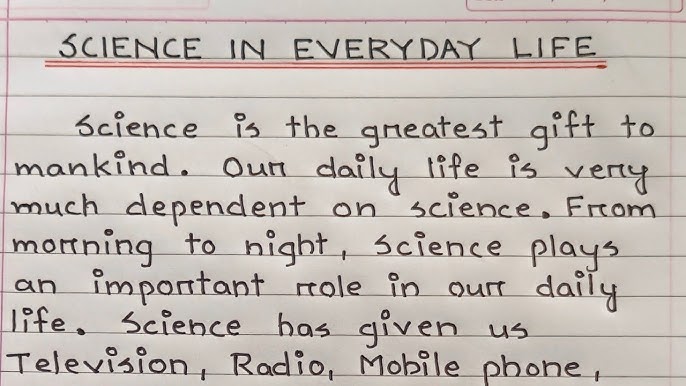Science impacts everyday life, contributing to advancements in technology, healthcare, and environmental sustainability. From the smartphone in your pocket to the food you eat, science plays a crucial role in shaping our modern world.
Science helps us understand the world around us, improves our quality of life, and provides solutions to complex problems. Incorporating scientific principles into daily activities can lead to a more sustainable and efficient lifestyle. By embracing science in everyday life, we can make informed decisions for a healthier and more prosperous future.
Through science, we can better comprehend the natural world and make mindful choices that benefit both society and the environment.

Credit: m.youtube.com
The Importance Of Science In Daily Life
Science plays a crucial role in our daily lives, impacting nearly every aspect of our existence. Understanding the importance of science in daily life is essential in recognizing how science directly influences our health, environment, and overall well-being.
Science And Health
Science and health are intricately linked, with scientific advancements contributing to healthier lives through medical breakthroughs, disease prevention, and innovative treatments.
Science And Environment
Science and environment intersect to address pressing issues like climate change, pollution control, and sustainable resource management for a healthier planet.

Credit: www.researchgate.net
Innovations Impacting Everyday Life
In today’s fast-paced world, innovations are constantly reshaping the way we live. From Technological Advancements to groundbreaking Medical Breakthroughs, these innovations play a crucial role in enhancing our daily experiences.
Technological Advancements
- Smartphones revolutionize communication.
- Artificial Intelligence simplifies tasks.
- Internet of Things connects our devices.
Medical Breakthroughs
- Gene editing offers personalized treatment.
- Robotic surgery enhances precision.
- Nanotechnology improves drug delivery.
These advancements not only aid efficiency, but also empower individuals to lead healthier and more connected lives.
Applications Of Science In Common Activities
Science plays a crucial role in our everyday lives, shaping the way we eat, travel, and communicate. Each daily activity is steeped in scientific principles that make them possible. Whether it’s the chemistry behind cooking or the physics of transportation, science influences our routine actions in numerous ways.
Food And Cooking
Food and cooking are a prime example of science in everyday life. Different compounds and reactions govern the flavors and textures we experience in our favorite dishes. Understanding the principles of heat transfer and chemical reactions allows us to create mouthwatering meals and delectable treats.
Transportation And Communication
Transportation relies heavily on scientific advancements, from the engineering of vehicles to the principles of propulsion and energy transfer. Similarly, communication technologies are a product of scientific breakthroughs, allowing us to connect across vast distances in an instant. The principles of electricity, magnetism, and signal processing form the backbone of modern communication systems.
Science In Economic Development
Science plays a crucial role in driving economic development across various industries. It provides the foundation for innovation, problem-solving, and efficiency. In this section, we will explore how science impacts two key sectors: industry and manufacturing, and agriculture and farming.
Industry And Manufacturing
Science has revolutionized the way we approach industrial and manufacturing processes. Through constant research and experimentation, scientists have developed new materials, technologies, and production methods that have transformed industries worldwide.
- Advanced materials: Scientists have discovered and engineered materials with improved properties, such as strength, durability, and heat resistance. These breakthroughs have led to the production of high-performance components for industries like aerospace and automotive.
- Automation and robotics: Science has paved the way for the development of sophisticated automation and robotics systems. These technologies streamline production processes, increase productivity, and reduce human error.
- Data analysis and optimization: With the help of data science, industries can analyze vast amounts of data to identify patterns, optimize processes, and make informed decisions. This leads to improved efficiency and cost-effectiveness.
- Energy efficiency: Science has driven advancements in energy-efficient technologies, allowing industries to minimize their environmental impact and reduce operating costs.
Agriculture And Farming
Science plays a vital role in ensuring sustainable and efficient agricultural practices. By applying scientific principles and innovations, farmers can enhance crop yield, improve nutrition, and minimize the use of resources.
- Genetic engineering: Scientists have developed genetically modified crops that are more resistant to pests, diseases, and adverse environmental conditions. These crops offer higher yields and require fewer pesticides.
- Precision farming: Through the use of sensors, data analysis, and automation, farmers can precisely monitor and manage their crops. This enables them to optimize water usage, fertilization, and pest control.
- Crop protection: Science has led to the creation of effective pesticides and herbicides that target specific pests and weeds, reducing the need for excessive chemical applications.
- Food processing and preservation: Scientific advancements have improved food processing techniques to extend shelf life, enhance nutritional value, and ensure food safety.
Science is the driving force behind economic development in industry and manufacturing as well as in agriculture and farming. By continually pushing the boundaries of knowledge and innovation, scientists contribute to the growth, productivity, and sustainability of these vital sectors.
Challenges And Ethical Considerations
Navigate the integration of science in everyday scenarios, raising insight on challenges and ethical dilemmas. It offers a thoughtful examination of how societal, environmental, and cultural factors impact scientific decisions and outcomes, urging responsibility in day-to-day interactions.
Ethical Dilemmas
Advancements in science bring with them numerous ethical dilemmas that society must grapple with. One major ethical concern is the use of animals in scientific research. While this practice has led to significant medical breakthroughs, it raises questions about the well-being and rights of animals. Scientists and researchers face the challenge of balancing the potential benefits of experimentation with the ethical treatment of animals. Additionally, the privacy and confidentiality of data collected during scientific studies can also present ethical challenges. Ensuring that individuals’ personal information is protected and used ethically is crucial to maintaining trust in scientific endeavors.
Environmental Impact
The rapid pace of scientific progress has given rise to concerns about its environmental impact. From the extraction of natural resources required for research to the disposal of hazardous waste, every step of the scientific process can have environmental consequences. It is essential for scientists to be aware of these impacts and adopt environmentally friendly practices wherever possible. Efforts must be made to minimize the use of non-renewable resources and develop sustainable alternatives.
Education And Scientific Literacy
Understanding and promoting scientific literacy is essential in today’s world. The ability to think critically and apply scientific knowledge to real-world situations is crucial for informed decision-making and problem-solving. Science education plays a vital role in fostering a deep understanding of the world around us and inspiring future innovators and problem solvers. This section will explore the importance of promoting STEM education and effective science communication in enhancing scientific literacy.
Promoting Stem Education
STEM (Science, Technology, Engineering, and Math) education is integral to cultivating a generation of individuals equipped with the skills and knowledge to address complex challenges. By emphasizing hands-on learning, problem-solving, and collaborative activities, STEM education encourages students to explore the wonders of science and develop a passion for discovery. This approach fosters critical thinking and prepares students for future careers in scientific fields, driving innovation and progress.
Science Communication
Effective science communication is essential for bridging the gap between scientific research and the general public. Through clear and engaging communication, scientific concepts can be made accessible to individuals of all backgrounds. By leveraging various mediums such as multimedia, interactive demonstrations, and engaging articles, the public can develop a deeper appreciation for science and its impact on society. Science communication efforts also play a crucial role in dispelling misinformation and promoting scientific understanding in the broader community.
The Future Of Science In Daily Life
In our rapidly changing world, Science continues to shape our everyday experiences. Let’s explore how Emerging Technologies and Societal Trends will impact our daily lives in the near future.
Emerging Technologies
The evolution of Artificial Intelligence (AI) is set to revolutionize how we interact with technology.
- AI-powered smart assistants like Amazon’s Alexa will become smarter and more proactive.
- Enhanced Virtual Reality (VR) and Augmented Reality (AR) experiences will blur the lines between reality and technology.
- Advancements in Quantum Computing will lead to faster processing speeds and data analysis.
Societal Trends
Changes in society will also influence how Science integrates into our daily routines.
- The growing focus on Sustainability will drive innovations in renewable energy and eco-friendly technologies.
- The rise of Personalized Healthcare will utilize genetic testing and AI to tailor treatments to individual needs.
- Increased connectivity through 5G networks will enable seamless communication and faster access to information.

Credit: brainly.in
Frequently Asked Questions For Science In Everyday Life Composition
What Are Some Examples Of Science In Everyday Life?
Science is all around us! Some examples of science in everyday life include cooking, where chemical reactions occur; driving a car, which involves physics and engineering; and even using a smartphone, where electronics and technology play a role.
How Does Science Impact Our Daily Lives?
Science impacts our daily lives in various ways. It helps us understand the world better, enables medical advancements for improved healthcare, enhances technology for convenient living, and even influences our decision-making process. Science is crucial in shaping our society, economy, and overall quality of life.
Why Is It Important To Learn About Science In Everyday Life?
Learning about science in everyday life is essential as it helps us make informed decisions, understand the world better, and solve everyday problems. Additionally, it promotes critical thinking, improves problem-solving skills, and fosters a scientific mindset, which is crucial in various fields and industries.
Science education prepares individuals for the challenges and opportunities of the future.
Conclusion
In embracing the marvels of science in our daily existence, we expose ourselves to a world of knowledge and innovation. Through a deep understanding of scientific principles, we can enrich our lives and enhance our surroundings. Exploring the intersecting realms of science and daily life opens up a universe of possibilities for growth and progress.







